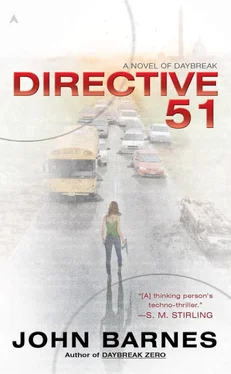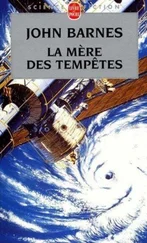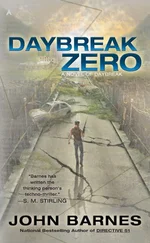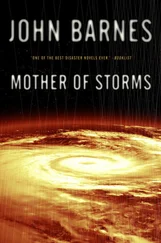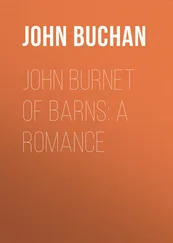“Good plan. Soak some of that off and you might score with a hot schoolteacher, especially if you let her take a quick splash in the tub first, before it’s half sweat from you.” She pulled down the pizza pan from the warming rack they’d built over the stove; the dough had risen, and it would be ready to bake as soon as the oven was hot, in about forty minutes. Meanwhile, they each had a bottle of Coors—bottled beer was fairly durable, especially in an unheated winter, and there had been plenty of it in the area on the day of Daybreak—and a slice of black bean bread with goat cheese. As the fire caught and began to warm the small converted garage, they stripped down to underwear for comfort, and Jason contemplated a couple more beers; some elk, goat cheese, and home-canned-tomato pizza; and a hot bath, and thought, Well, this is more like what I had in mind for Daybreak. If I could ignore all the corpses I guess I might feel all right about it.
“Did you see the new Weekly Pamphlet down from Pueblo today?”
“No, there’s not a lot of reading time out there. Has someone come up with a way to make gopher meatballs taste better?”
“The people in Pueblo are geniuses, Jason, but that would take more than genius.”
The Pueblo Weekly Pamphlet was widely mocked and derided, and just as avidly read. Realizing that it might be a long time before people could reliably write to request free information, and probably even longer before an old-fashioned paper catalog could be prepared, the good scholars of Pueblo looked for anything potentially useful in surplus in the warehouse, and once a week, sent out a pile of pamphlets in rough proportion to the population of the towns that had subscribed.
The pamphlets were whatever happened to be possibly useful in the America of today, and to take up too much room in the warehouse of yesterday: how to hand-sew a shirt from scratch without a pattern, how to maintain a compost heap, and so on. People had laughed when they received “Fun Indian Crafts for Boys and Girls 10-15” until they discovered it had directions on making moccasins. Some of the pamphlets must have been eighty years old—the one on laying out a victory garden probably was—and people laughed at the silly graphics and odd social assumptions of the past, but the pamphlets were read eagerly, passed from hand to hand, and their recipes and procedures recopied into notebooks; the interpretation of some of their directions could provide a whole evening of conversation nowadays. (“When they say to cull the runts in the baby rabbits, can we still eat them, just as long as we don’t let them breed?”—Jason remembered two guys arguing about that for most of an afternoon while they dressed deer hides together.)
“This one’s from the wrapper,” Beth said. “So it’s a bigger deal.” Each bundle of pamphlets was tucked into the wrapper, a folded sheet of newsprint, on which were printed all the government announcements from both Athens and Olympia. They double-wrapped each package of pamphlets, since wrappers were printed front and back; the receiving towns posted the wrappers somewhere everyone went: the town hall if there was one, the general store for towns that had been able to maintain private commerce, the town dining hall for those which had not. People stood in line to read the wrapper with a pencil and pad at hand; there might be any number of possible things, from a call-up of reservists for a particular year to the offer of a position of postmaster in a neighboring town. Decoding the wrapper was another source of conversation—did the search for former commodities investors mean that futures markets might re-open? Did the request for information about aircraft near Austin, Texas, mean enemy reconnaissance, an eccentric inventor, or an attempt to find a person maliciously spreading rumors? Did the request for desks and chairs in the Denver area mean some Federal offices would be opening there?
“So…” Jason said, “what’s the news?”
“They want former Daybreakers to come to Pueblo and be studied. It says ‘No one will be investigated, arrested, or punished.’ They’re looking for people who have turned against Daybreak and would like to help undo it.”
“And that’s us. If we want to do it.”
“Yeah.”
“How do you feel?”
“I love life here,” Beth said. “I got friends, we got our own comfy place. And my wrist ain’t all the way healed yet, and it’s a long, hard, dangerous walk, and… but we said it, Jason, we said it ourselves, we said it all the time all winter, we said we wanted to undo Daybreak, it was all a big mistake.”
He sighed. “Yeah. Well, for tonight it’s hot fresh pizza and a hot bath.”
“And a hot schoolteacher.”
“You see what a lucky bastard I am. But, yeah, look how warm and comfortable we are. Life seems, I don’t know, more meaningful, I mean, the work we do really matters to people we care about, and I kind of find myself thinking that maybe Daybreak was a good idea after all. Except for everyone we killed, of course. And all the sadness and physical misery and people dying too young.”
“I can’t even tell if you’re being sarcastic.”
“Me either. If the oven’s hot enough, let’s put the pizza in, and open another beer. We’re not going to decide tonight.”
PART 4
ONE MONTH AND TWO DAYS
April has always been the month of danger in the Northern Hemisphere; if you think of war, if you brood upon it all winter, if you are longing and thirsting to fight, then in April the ground is just dry enough to move upon, there has been just enough good weather to drill the troops, the danger of sudden winter storms is low enough, the need for men for the spring plowing and planting has mostly passed.
In more recent centuries, late summer became dangerous, because armies moved so swiftly that there was the hope to finish the fighting just as the snow fell and “send the boys home for Christmas.”
But this year, almost nothing moved any faster than it had in 1850, and as with so many things, the rhythm of war fever fell back into its more ancient pattern.
From Pueblo, Heather and her team followed the bad news that poured in from everywhere.
On April 1st, on the old Great Northern Line, a steam train dispatched by the Olympia government was intercepted on the long trestle east of Minot by pro-Athens partisans who were at least partly led by Air Force officers from the base. The train carried 250 newly-sworn-in Federal officials to be the liaison with the New State of Superior, which was supposed to combine the states of Wisconsin, Minnesota, and Michigan until they could resume their independent existences. The partisans’ makeshift barricade derailed and destroyed one precious steam locomotive, and in the brief confused melee after the wreck, about forty of the Olympian clerks and administrators were killed. Some witnesses reported injured men and women being shot where they were pinned in the wreckage. Three Olympians who had returned fire during the brief fighting were hanged from the trestle. The rest were imprisoned on the former air base.
Simultaneously, in Green Bay, the capital of Superior, the Olympian temporary government was attacked by an armed mob which purported to be defending the traditional rights of Michigan, Minnesota, and Wisconsin. Quick action by a company of Wisconsin Guard suppressed the mob. Among those captured were ten soldiers from Fort Bragg. Treated as soldiers out of uniform on a sabotage mission, they were sentenced to death the next day, but the governor of Superior suspended their sentences.
On April 4th, Alpha/2 of the President’s Own Rangers arrested the pro-Athens commanding officer and many of his officers at Mountain Home AFB, taking the survivors back to Olympia for a possible prisoner exchange—or a trial if necessary. The remaining personnel on the base were given a choice of “nine minutes to swear loyalty to Olympia, or ninety days to walk to Utah.”
Читать дальше
